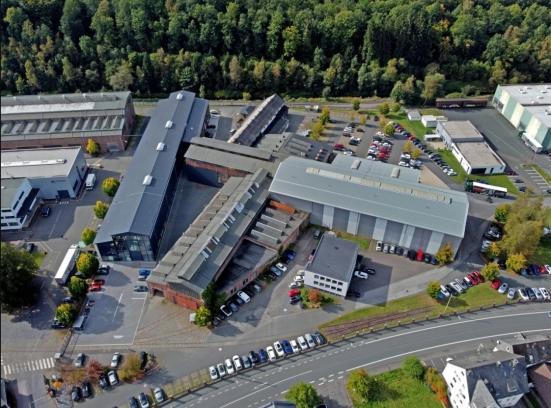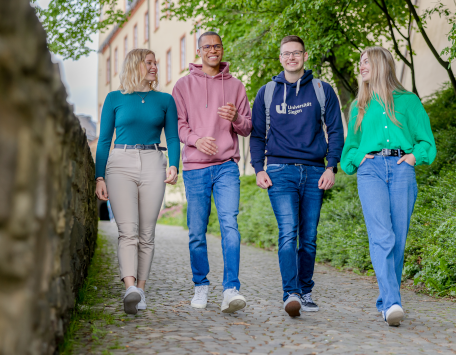REGIONALE 2025 recommends funding for four projects at the University of Siegen
Green Factory: Lighthouse project for sustainable industry
With the "Green Factory" at the Buschhütten campus in Kreuztal, South Westphalia could soon have a lighthouse project for innovative circular economy and provide a great transfer of knowledge for the industry of the future: seven chairs and institutes of the University of Siegen and RWTH Aachen University, the Smart Demonstration Factory at the Buschhütten campus, the start-up Smart Plastify and numerous companies want to show how industrial buildings can be sustainably upgraded and how circular production with high-quality metals and plastics can work. The project received the second and third star at the same time. The REGIONALE 2025 committee's funding recommendation means that an estimated 22.4 million euros in funding from the state of North Rhine-Westphalia and the European Regional Development Fund (ERDF) could flow to South Westphalia - this would be the largest individual funding in the REGIONALE 2025 in South Westphalia to date. In connection with the Buschhütten Campus in Kreuztal, the "Green Factory" focuses on two central project modules: "Cyber Sustainable Building" for the sustainable redesign of existing industrial buildings and "Green Manufacturing" for circular production processes. "Combining existing industrial architecture with modern, circular manufacturing processes is a forward-looking model. Together with our partners, we are demonstrating how ecological responsibility and economic viability can go hand in hand - and that sustainable production can actually be implemented," said a delighted Prof. Dr.-Ing. Peter Burggräf, Chair of International Production Engineering and Management (IPEM) at the University of Siegen.
Further information on the project can be found on the REGIONALE 2025 website.
MARS: Labor market research for a resilient region
Skills shortages, demographic change, digitalization and AI: these are just four of the many challenges facing the economy in South Westphalia. The research project "MARS - Modeling Labor Market Shifts in South Westphalia" at the University of Siegen in cooperation with Chemnitz University of Technology aims to find answers to how companies can hold their own in times of great change. The project aims to investigate how the labor market in South Westphalia can be made resilient, sustainable and future-proof. To this end, the project participants want to use modern methods of network research and collect targeted data in order to understand how people, companies and institutions in South Westphalia work together and influence each other. With support from the region, it was awarded the third star at the first attempt and was recommended for funding by the ERDF review committee. This means that an estimated 1.42 million euros from ERDF funds and the state of NRW could flow to South Westphalia. Junior Professor Dr. Svenja Flechtner from the University of Siegen says: "We are delighted that the REGIONALE stars not only certify that we have a very good idea and a viable concept, but that implementation can now also take place. Being able to put into practice a plan that we have been very enthusiastic about since it was drawn up means we are very happy and looking forward to it."
Further information on the project can be found on the REGIONALE 2025 website.
KoWIMA: Inclusive working world of the future
With the "KoWIMA" project ("Competence and knowledge development for the integration of people with disabilities in the workplace"), the University of Siegen aims to make South Westphalia's working world of the future more inclusive and barrier-free. The focus is on digital aids and a high level of knowledge transfer. The aim is to integrate people with disabilities and employees who have suffered an accident or illness more naturally into the world of work and to enable companies to design barrier-free workplaces in order to retain and attract skilled workers. The "KoWIMA" project was awarded the third star at the first attempt and was recommended for funding by the ERDF evaluation committee. This means that an estimated 1.012 million euros from ERDF funds and the state of NRW could flow to South Westphalia. So-called KoWIMA scouts combine theoretical and practical knowledge and develop a holistic concept that strengthens and develops the skills of people with disabilities, older people and people with health problems as well as companies in South Westphalia. "We show how ageing employees can keep an optimal job and how new skilled workers with disabilities can get an optimal job. Through our project, companies can meet their social responsibility and at the same time create a competitive advantage for the entire region," says Dr. Claudia Müller, holder of the Chair of IT for the Ageing Society at the University of Siegen.
Further information on the project can be found on the REGIONALE 2025 website.
SelfDiag: Digital medicine for rural areas
The "Digital Specialist & Health Center Spieren" (DFGZ) in Olpe is testing new ways to improve medical care in rural areas. With the help of artificial intelligence, the aim is to gradually enable patients to carry out routine examinations such as ECGs themselves. The "SelfDiag" project by the University of Siegen and the DFGZ was awarded the third star in the REGIONALE committee at the first attempt and was recommended for funding by the ERDF review committee. This means that an estimated 725,000 euros from the state of North Rhine-Westphalia and the European Regional Development Fund (ERDF) could flow to South Westphalia. As part of the project, doctors will receive support for standard examinations such as an ECG from a virtual figure (avatar) based on artificial intelligence. This avatar should speak as naturally as possible, explain the individual steps to patients, give them instructions and, for example, allay their fears. The idea is not to use digital innovation to completely replace medical staff during standard examinations, but to reduce the workload, shorten waiting times and help improve medical care. "We are proud to develop 'SelfDiag', a digital tool that helps people to better understand their health. The development of a digital, AI-supported self-diagnosis platform is a significant step towards patient-centered care," explains Rebecca Gerstenberg, who is supervising the project as a Research Assistant at the University of Siegen.
Further information on the project can be found on the REGIONALE 2025 website.
Background information
All four projects are being funded via the "REGIONALE Südwestfalen - Projects for a digital, sustainable and authentic future in South Westphalia" call. The REGIONALE 2025 is a structural program of the state of North Rhine-Westphalia and is supported by federal and state urban development funds.



